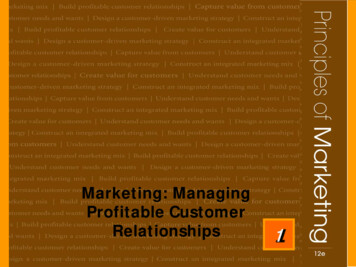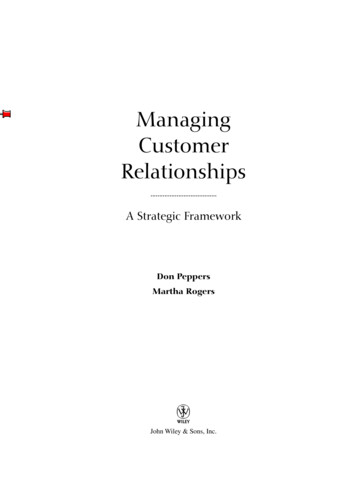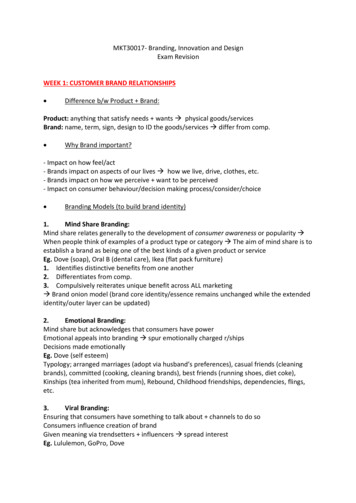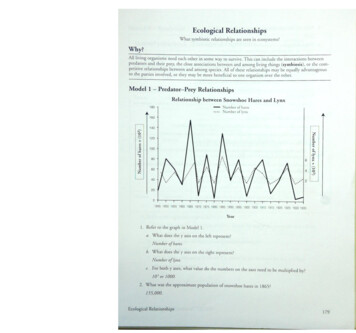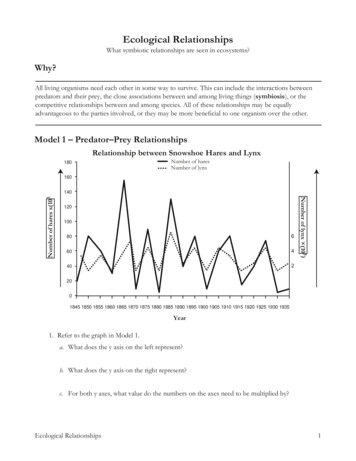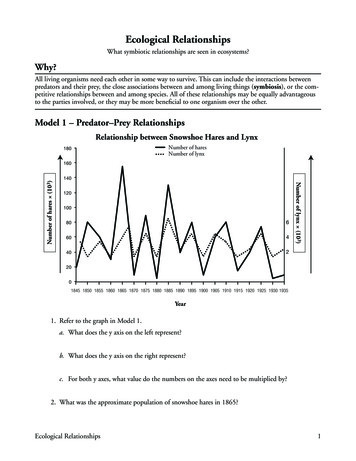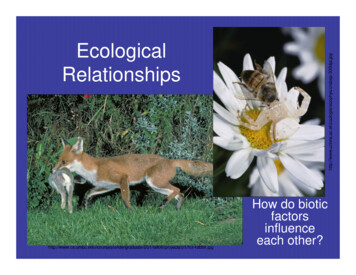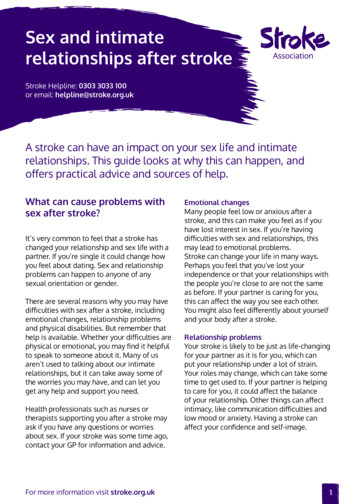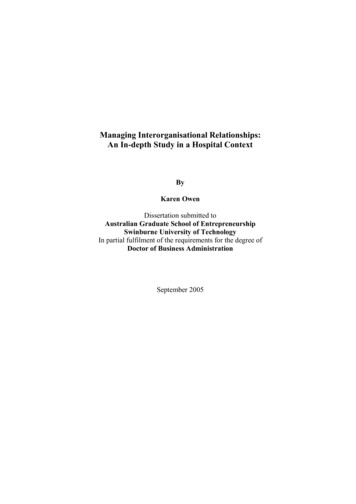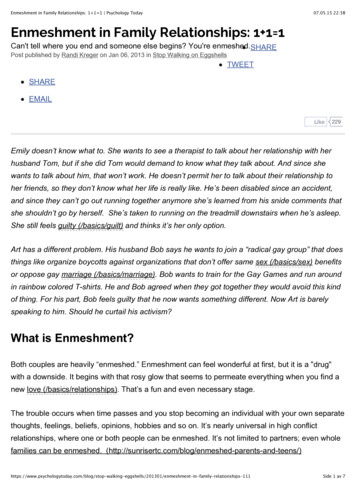
Transcription
Enmeshment in Family Relationships: 1 1 1 Psychology Today07.05.15 22:38Enmeshment in Family Relationships: 1 1 1Can't tell where you end and someone else begins? You're enmeshed.SHAREPost published by Randi Kreger on Jan 06, 2013 in Stop Walking on EggshellsTWEETSHAREEMAILLike229Emily doesn’t know what to. She wants to see a therapist to talk about her relationship with herhusband Tom, but if she did Tom would demand to know what they talk about. And since shewants to talk about him, that won’t work. He doesn’t permit her to talk about their relationship toher friends, so they don’t know what her life is really like. He’s been disabled since an accident,and since they can’t go out running together anymore she’s learned from his snide comments thatshe shouldn’t go by herself. She’s taken to running on the treadmill downstairs when he’s asleep.She still feels guilty (/basics/guilt) and thinks it’s her only option.Art has a different problem. His husband Bob says he wants to join a “radical gay group” that doesthings like organize boycotts against organizations that don’t offer same sex (/basics/sex) benefitsor oppose gay marriage (/basics/marriage). Bob wants to train for the Gay Games and run aroundin rainbow colored T-shirts. He and Bob agreed when they got together they would avoid this kindof thing. For his part, Bob feels guilty that he now wants something different. Now Art is barelyspeaking to him. Should he curtail his activism?What is Enmeshment?Both couples are heavily “enmeshed.” Enmeshment can feel wonderful at first, but it is a "drug"with a downside. It begins with that rosy glow that seems to permeate everything when you find anew love (/basics/relationships). That’s a fun and even necessary stage.The trouble occurs when time passes and you stop becoming an individual with your own separatethoughts, feelings, beliefs, opinions, hobbies and so on. It’s nearly universal in high conflictrelationships, where one or both people can be enmeshed. It’s not limited to partners; even wholefamilies can be enmeshed. onships-111Side 1 av 7
Enmeshment in Family Relationships: 1 1 1 Psychology Today07.05.15 22:38In enmeshment, people feel like their well being is not complete unless they’re meeting theirpartner’s needs all the time. They worry that their relationship is not "close" if they’re not theirpartner’s shadow--"if we're not intertwined emotionally we're nothing." Both people feel like theyneed to constantly be involved in aspects of each others' lives, but then may resent that fact whenthey want some individual space.In healthy relationships with a strong connection, however, each person can pay attention to theother without losing or compromising their sense of self. Neither changes who they are or whatthey think or feel to please the other person. They can be apart without falling apart and betogether without losing their individuality. Love is about the freedom to be yourself and be lovedjust the way you are, even if it's different from your partner.Examples of enmeshment include:Family members feel threatened by the each other’s growth and independent choices, bothbig and small.Someone uses fear (/basics/fear), obligation and guilt (emotional blackmail) to keep theothers in line.One person feels that they need “permission” from the other, while the diminished partner’sneeds go unvoiced and unmet.Partners are supposed totally satisfy each other, so they spend all their time together andhave few of their own friends.HomeFinda TherapistTopics about everydayGet Help issues. MagazinePartners can’tmakedecisions for themselvesTestsAny type of privacy is seen to be “secretive,” so family member have access to each other’spersonal papers, emails, correspondence and so on. Some demand to know the other’spersonal thoughts or the content of discussions with others.Being controlled, attached, and entangled in these ways is seen as “normal”—even loving.Difficulty differentiating one's emotions from those of their family member.Andrew Holzman from Family Tree Counseling Associates in Indianapolis says that enmeshmentis a loss of freedom, of voice, and of self-worth (/basics/self-esteem). It masquerades as caring,loving concern and a neediness that shames the partner who cannot fix things, make them onships-111Side 2 av 7
Enmeshment in Family Relationships: 1 1 1 Psychology Today07.05.15 22:38or rescue them from their pain. Each believes the other is the key to their happiness(/basics/happiness).Why Enmeshment is UnhealthyEnmeshment is bad for both people in the relationship and the relationship itself.It places a heavy burden on the other to meet all their needs, spoken or unspoken, whichthey cannot do. This inevitably leads to disappointment.Your high conflict partner’s emotions may roller coaster from one place to the other. Tyingyour emotional life to theirs is asking for trouble, especially if you have children. One of you,at least, needs to be on an even keel.In enmeshed relationships, we’re not experiencing our partner as they are, but as we wantthem to be. True connection and love grows when two individuals are authentic with eachother, not when they demand the other to be a twin.When individuality is seen as disloyal or an attack, it hinders growth and strength in theindividual and the relationship. They can become stunted, unhappy and clingy, which putsthe relationship at risk. Enmeshment can also feed resentment and a feeling of being trappedon the part of either one of you. What people intend to keep them together instead drivesthem apart.Fused relationships lead to codependency, and codependency leads to fused relationships.Having your own life and interests makes you an interesting person and gives the two of yousomething to talk about. One person’s growth can spur it in the other. Become aware of therichness that arises when you have different ideas, opinions, and viewpoints. Don’tautomatically discount them.What to Do About EnmeshmentEnmeshment is a complicated topic, and the gold standard is to speak with a clinician who canhelp you take the journey toward understanding (/basics/empathy) yourself, developing an identity(/basics/identity), and knowing when to act and when to leave well enough alone. I will make somegeneralities, but it’s best to talk to a professional who can help you apply them to your hips-111Side 3 av 7
Enmeshment in Family Relationships: 1 1 1 Psychology Today07.05.15 22:38situation.In sum, the best advice I can give you—and this applies to most everything having to do with highconflict personalities—is to take responsibility for your own thoughts and behaviors and let yourpartner take responsibility for theirs. Recognize your over-involvement in your partner’s life. Othersmay need to point this out, so be open to feedback.Enmeshment, like so many things, is something that exists in your mind. Your attitude and beliefswill determine whether you are willing to permit enmeshment in your relationship or not. If youcontinue to think that enmeshment is normal and proof of love and part of your identity, you willcontinue to be in enmeshed relationships. So after you’re aware of it, you need to be willing tochange.The next step is a critical one: you need to learn that you don’t need anyone’s permission to haveyour own thoughts and feelings. Let’s repeat that: you don’t need anyone’s permission to haveyour own thoughts and feelings. Every person deserves privacy: their own private thoughts,opinions, spaces, and email addresses. Adults don’t need permission to have a separate life oftheir own, including having innocent contact with opposite sex coworkers and friends. The bestrelationships are when people have healthy, fulfilling lives on their own and then share them withpartners who cherish them for who they are.Being in a relationship requires judgment and balance. Having a private emotional affair is onething. Having a private relationship with your therapist is another. You don’t need to disclose thecontent of your conversations with anyone, unless it violates something that is not yours todisclose, such as someone’s school grades, work problems, quirky habits and so on.If your partner wants you to keep secrets, ask yourself who benefits from this. Is this a demand toisolate you and keep you from fact-checking what’s normal? You deserve—and desperately need—friends and family with whom you can be honest about your high conflict relationship. They’reyour touchtone to reality and a normal life.David Prior, LMFT, the executive director at Sunrise RTC, adds these suggestions:Don’t look at your partner’s critical feedback as a failure on your part. If you've been readingthis blog or any of my books, you should know enough about yourself and BPD/NPD ips-111Side 4 av 7
Enmeshment in Family Relationships: 1 1 1 Psychology Today07.05.15 22:38recognize why this happens.Sit with your own emotions without blaming your partner if you choose to take thempersonally rather than recognize it as an aspect of their illness. This will take a lot of time andeffort.Don’t take on your partner’s feelings or project your emotions onto them. This is a ticket onthe Tilt-A-Whirl ride at the State Fair.Allow yourself and your partner to experience your own successes and failures, including thefallout of their behavior toward you. When they fail, be there to support them without takingresponsibility for the fix. Don’t allow them to confuse you and apologize when you haven’tdone anything wrong. Doing this just to soothe them is a short-term fix that makes thingsworse in the long run.Once there is a bit more space between you, coming together will be much more fun.Copyright 2015, Randi Kreger. This post (or any part of it) may not be reproduced withoutprior written permission.Randi Kreger is the owner of BPDCentral.com and the Welcome to Oz online familycommunity. You can find her books "The Essential Family Guide to Borderline PersonalityDisorder (/conditions/borderline-personality-disorder)," "The Stop Walking on EggshellsWorkbook," "Stop Walking on Eggshells," and "Splitting: Protecting Yourself WhileDivorcing a Borderline or Narcissist," at her store at BPDCentral.com. 6CommentsRecent Posts in Stop Walking on EggshellsNew Film Features aBorderline Woman Who Startsa TV Show (/blog/stop-walking-Finally, An Online Group ForKids With a Borderline ment-in-family-relationships-111Side 5 av 7
Enmeshment in Family Relationships: 1 1 1 Psychology Today(/blog/s -whotopwalkin starts-tv-show)g-After winning 86 million, a woman with BPDeggshehosts her TV show, "Welcome to Me"07.05.15 22:38(/blog/s ne-parent)topwalking-This Facebook page for kids is provided ne--whostarts-parent)tvshow)The "Lightbulb htbulb(/blog/s effect)topThe suden realization you don't need to takewalkin abuse anymoreMisdiagnosis of Men WithBorderline Personality Disorder(/blog/stop-walking(/blog/s alitytopwalkin ul503/misdiagnosis-beffect)menborderline-Half of the borderline population consists of nt-in-family-relationships-111Side 6 av 7
Enmeshment in Family Relationships: 1 1 1 Psychology TodayTreatment for BorderlineDisorder May ReduceDistortions (/blog/stop-walking(/blog/s reducetopwalkin distortions)gSister wonders if treatment can stop her siblingeggshells/201503/trefrom lying07.05.15 22:38The Thin Line Between Loveand Hate /blog/s between-love-and-hate)topThe emotions of love and hate take place inwalkin overlapping parts of the hips-111Side 7 av 7
Workbook," "Stop Walking on Eggshells," and "Splitting: Protecting Yourself While Divorcing a Borderline or Na
